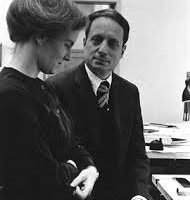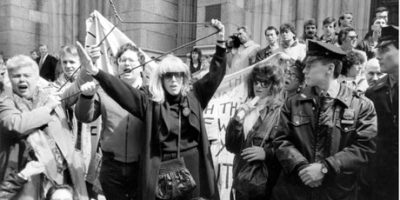And Now, Shlomo Carlebach the Musical…
To many of his fans, Rabbi Shlomo Carlebach was a great musician. To others, he was a gifted storyteller. To many of his followers, his music and stories were mere vehicles for teaching Torah. But what really mattered to Carlebach was people. To him, music and Torah and God and Hasidic tales were vehicles for reaching hearts — of Jews and non-Jews alike.
Such is the message of “Soul Doctor,” the musical bioplay about Carlebach’s life, written by Daniel Wise and starring Eric Anderson in the title role, which opened on Broadway in August. Carlebach, who died in 1994, was an Orthodox-trained rabbi from an illustrious rabbinic family in pre-World War II Germany. His melodies are now standard in synagogues and at Jewish weddings throughout the world. During his lifetime, however, Carlebach was far from mainstream. The show chronicles his tumultuous early years: fleeing from Austria to America as a child in 1938, his days as a yeshiva student and young Hasid of the Rebbe of Lubavitch, his evenings of exploration, tentatively stepping away from the study hall to play music in bars and music clubs, until finally establishing his outpost of “holy hippelech,” as he called his followers, at the House of Love and Prayer, in Haight-Ashbury, San Francisco.
Along the way, he is taught to play guitar by a blind, homeless woman; develops a friendship with Nina Simone (played spectacularly by Amber Iman) from whom he learned about, and drew inspiration from, gospel music and revival meetings; and finally, is banned by the Orthodox establishment. The rabbis excoriate him for his unconventional ways: hugging and kissing women, allowing women to sing along with him, and imbibing the free-love, hippie spirit of the 60s, all of which was anathema to Orthodoxy.
And yet, his influence seeped back in through the cracks.
I remember when I first heard Carlebach. It was during the early 90s, and I was a teenage yeshiva student studying among the Skver Hasidim of New Square, N.Y. I was in my room in the yeshiva dormitory, when a friend slipped me an audiocassette. “Listen to this,” he said quietly. “You’ll like it.”
The tape was “Shlomo Carlebach’s Greatest Stories,” and I stuck it into my Sony Walkman, on which I ordinarily listened to Torah lectures and an occasional cantorial album. Over the next week, each night after the dormitory monitor left, I would listen to the stories of Chatzkele Lekuvid Shabbos, and the Holy Miser, and the Blind Beggar, and the Heiliger Kotzker Rebbe and the Sea of Jewish Tears.
These were Hasidic tales like I’d never heard
before — and this in a world where Hasidic tales were all the tales you got. There was something about how Carlebach told them, the music of his voice, the German-Yiddish inflections with the soft accompaniment on guitar, the folksy, rambling diction that gave it all the world’s charm, and, most of all, the pain and the joy his stories conveyed.
I hadn’t heard any of Carlebach’s albums before, although I’d been aware of him. Every now and then it was whispered that one popular Hasidic melody or another was composed by him — “ah kahlbach niggun,” some zealot would hiss furiously — but the song would be sung anyway, since, really, who was to know for certain, if no one could publicly admit to listening to the records?
It was in that first tape that I was struck by one line, which would come to define Carlebach for me. It was a Yiddish quote from Rab Kalmishel of Piasetzna: “Di greste zach in di velt iz tihn yenem a toiveh.”
The greatest thing in the world is to do someone a favor.
Not Torah study, or prayer, or keeping the Sabbath, or any of the other commandments. Not even to perform some monumental good deed.
Just do someone a favor. Pass the peas. Hold open a door. Keep the light on.
This was not just a good thing, but the greatest thing in the world.
Mamesh, a gevald. The deepest depths.
That was Carlebach’s standard description for his stories and the people in them — “the deepest of the deep, the sweetest of the sweet, the holiest of the
holy” — although in the strictest sense, “deep” wasn’t what his messages were, exactly. Sometimes they were quite superficial, if counter-intuitive, and more than a little sentimental, but Carlebach was a genius at knowing what stirred people, and he found hints within the tradition for those feel-good vibes.
In “Soul Doctor,” Carlebach is seen first getting those vibes from a revival meeting he is invited to by Simone, where he watches worshippers whipped into an ecstatic frenzy through one of his own songs. This inspires him to do something similar at his father’s synagogue, where his task is, literally, to “wake up the shul president.”




